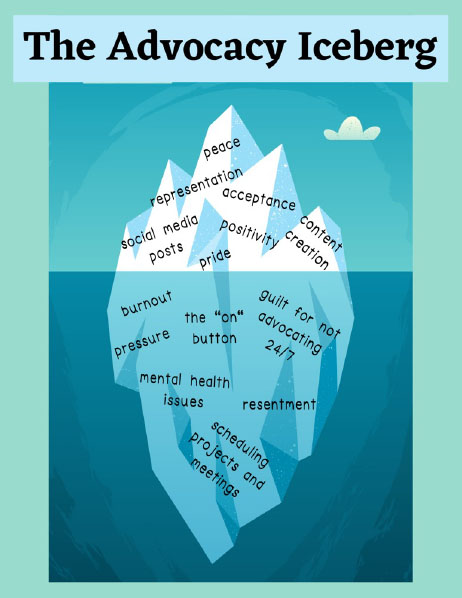The Advocacy Iceberg

Blog By James Hayden
If you’ve been in the stuttering world long enough, then you’ve heard the popular stuttering iceberg analogy. For those unfamiliar with it, allow me to explain. Only 10 percent of the iceberg is visible, while the remaining 90 percent is underneath the surface. Likewise, only 10 percent of stuttering is visible, while the remaining 90 percent is beneath the surface. During a stuttering moment, the audience sees: the head jerks, the blocks, the lack of eye contact, and the other minute details associated with stuttering. What the audience doesn’t see is the 90 percent that typically lives rent free in a person who stutters (PWS) head: guilt, shame, embarrassment, doubt, fear, wondering if their voice is worth hearing, among many others.
Recently, I was talking to my friend Nicole about a presentation I was preparing to give. The topic was about my hiatus from public advocacy and what I learned from it. As we were talking, I realized that advocacy is like an iceberg. Once that comparison left my mouth, I stopped in my tracks. I never thought about it until that moment, but it’s so true.
Before my hiatus, I thought advocacy had to involve “big things.” Articles galore. A TEDx talk. Guest lectures at numerous universities. Presenting at conferences and networking events. Podcast appearances. Social media posts sharing only great things about stuttering. Whenever I talked about stuttering, I felt that I had to give my audience the rainbows and unicorns version of stuttering. God forbid people hear the unfiltered version about stuttering and how it sucks 24/7/365. Like an iceberg, my social media followers and most people in my life saw just 10 percent of my advocacy work. The good stuff as I call it.
What my social media followers and most people in my life didn’t see nor did I talk about is my struggle. The 90 percent of advocacy. Looking back over the past two years or so, signs of burnout were hiding in plain sight. I just didn’t want to acknowledge them.
At the beginning of every semester, I would take my weekly off day and dedicate it to reaching out to professors and scheduling my guest lectures. If I had to re-arrange my work schedule or cancel personal commitments, then so be it. Back then, it was worth it. I was willing to do back-to-back guest lectures because I put the needs of 10-year-old James and every other PWS over my current needs. I needed to let the future SLPs know what my current self and 10-year-old James wanted and needed them to know.
Because most people know me through my advocacy work, I felt the need to always “be on.” To be the guy that thought stuttering was great when I didn’t believe that all the time. As a result, I was never able to be my true self when I went to support group meetings. The perception of me had to be in attendance, while the reality of me was absent.
In addition to feeling like I always needed to “be on,” I also felt the constant pressure to create content. I felt guilty if I didn’t spend a few hours every weekend working on at least one article. This constant pressure made me sacrifice time with my family, friends, and other interests. If the article I had spent so much time on didn’t receive a certain number of likes, comments, or shares, then I would view the article as a failure and that it wasn’t worth the sacrifices I made.
From August 2021 to late March/early April 2022, the signs of burnout got bigger and bigger until I had to take a step back and go on an indefinite hiatus from public advocacy. The constant pressure to “be on” and create content did a number on mental health and led to me resenting everything I had accomplished. I needed to figure out who James the person was separate from James the advocate. I needed to learn how to be proud of everything instead of resenting everything I had done. I was willing to give up being a public advocate for the sake of my mental health and overall well-being.
Eventually, I was able to reconcile my public image and personal life. This took months of working on myself and realizing who I am and what do I want to do with this one life I have. Now, I’m proud of my accomplishments. Yet, I try to not let them define me. Rather, like my stutter, I just see them as fun facts about myself.
So, how do we combat the 90 percent of advocacy? For me, it was realizing the importance of setting boundaries. I no longer overextend myself. I no longer sacrifice my mental health or reorganize my entire schedule to fit in a podcast or a guest lecture. I’m selective on what articles I write, universities I present at, and podcasts I do. I realized that public advocacy should just be one small part of my life and not my entire life. I realized that living a life that shows “it’s ok to stutter” is the best form of public advocacy. Another thing that helped me was talking about the 90 percent with my therapist, close friends, family members, and eventually the public.
For my fellow advocates, realize it’s OK to put yourself first. Who you are outside of the advocacy world is just as important, if not more so, than who you are in the advocacy world. What you view as little things just might be the one big thing that someone in your community needs. Lastly, advocacy is something you live, not something you check off your to-do list.
 Illustration by Nicole Kulmaczewski
Illustration by Nicole Kulmaczewski
Posted May 26, 2023